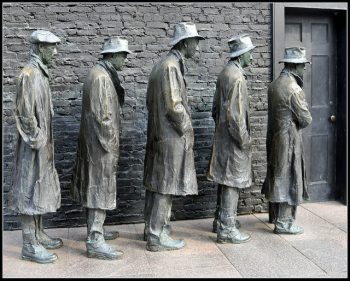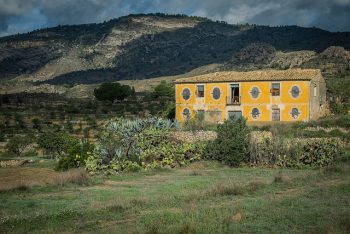Family Stories (Parivaar ki Kahaaniya) Posted by Rachael on Feb 20, 2017 in Hindi Language, Uncategorized
Most people enjoy listening to stories (कहानियाँ/kahaaniyaan, fem. plural noun. Singular noun: कहानी/kahaani) about their family (परिवार/parivaar, masc. noun), and I am certainly one of those people. I especially enjoy listening to my parents’ stories of when they were younger and, when my grandmother was still with us, I loved hearing her stories of growing up during times (ज़माना/zamaanaa, masc. noun) very different and yet strikingly similar to those we live in now. One person whom I particularly admire and respect (X का आदर करना/X ka aadar karnaa or X की इज़्ज़त करना/X ki izzat karnaa) is my maternal grandfather, whose name was Bernard. In English, we do not usually differentiate relatives based on which side of the family tree they are on––maternal or paternal. But, in Hindi, one’s maternal or paternal status matters greatly, which is why I emphasize that he was my maternal grandfather or Nana/नाना (female equivalent is Nani/नानी), rather than my paternal grandfather or Dada/दादा (female equivalent is Dadi/दादी).
Bernard was an incredible person by any measure of the word. Born in 1915 and a native of New Haven, Connecticut, Bernard grew up during difficult times. His parents divorced when he was still quite young (जवान/javaan, adjective) and, most likely due to the severe economic conditions of the Great Depression (1929 to late 1930s) and his father’s remarriage to a woman with many children of her own, his parents ensured that he and his sister, Jane, were raised by another couple until their circumstances (परिस्थितियाँ/paristhitiyaan, fem. plural noun. Singular noun: परिस्थिती/paristhiti) stabilized.
When he grew up, he enlisted in the navy as a medical corpsman and served in China prior to Pearl Harbor (December 7, 1941), after which he served in World War II (दूसरा विश्व युद्ध/Dusraa Vishva Yuddh). On August 5th, 1942, he was reported missing in action in the Manila Bay area of the Philippines and, on May 10, 1943, it was discovered that he had been captured by the Japanese while in the Philippines and was now a prisoner of war. He lived in various Japanese prison camps for over three years. For some time, due to the dire conditions (अवस्थाएँ/avasthaaen, plural fem. noun. Singular noun: अवस्था/avasthaa) in which most of these prisoners lived, it was assumed that my grandfather had died. Needless to say, he endured many hardships (कष्ट/kasht, masc. noun or कठिनाई/kathinaai, fem. noun) during his time as a prisoner and lost a dramatic amount of weight during this period due to enforced starvation. Additionally, he contracted a disease (रोग/rog, masc. noun) known as “Beriberi,” a thiamine (or vitamin B1) deficiency common in regions where polished white rice (चावल/chaaval, masc. noun), which has been stripped of its nutritional value by the polishing process, is a dietary staple. This disease can have many side effects later in life, including cardiovascular disease.
Finally, on September 19, 1945, it was discovered that my grandfather was, indeed, alive (ज़िन्दा/zindaa, adjective) and was waiting in San Francisco, California to be reunited with his loved ones. Upon hearing this news, his mother (माता/maataa or माँ/maan) and sister (बहन/behen) set out for California to meet him. Luckily for me, the Portsmouth Herald, a newspaper (अख़्बार/akhbaar, masc. noun) based in Portsmouth, New Hampshire, where my grandfather went to high school, regularly published updates on his whereabouts throughout the war (युद्ध/yuddh, masc. noun or जंग/jang, masc. noun).
Fortunately, my grandfather was decorated with a purple heart for his services (सेवा/sevaa, fem. noun) to the United States during the war. Twenty years later, Bernard retired from the navy after receiving a slew of other honors, including a Bronze Star Medal, for his service during peace and wartime. He worked as a life insurance agent for the remainder of his life, but he never forgot his dream (सपना/sapnaa, masc. noun) to study other languages and cultures. He was particularly passionate about the Spanish language and the culture and literature of Spain. In his 70s, he finally got the chance to obtain his Bachelor’s Degree at Boston College in Romance Languages and Literatures with the help of funding from the G.I. Bill. Moreover, he got the opportunity (मौका/maukaa, masc. noun) to travel to Spain and the United Kingdom. As a father of six children, he would often search for ways to save money to support his family. So, when he got the chance to travel (सफ़र करना/safar karnaa, verb) to Spain, he decided to save money on airfare and strap himself to the floor of a cargo plane! He was able to do this because he flew from an air force base in Southern New Hampshire to which active and ex-military members had access.
Another example of his passion and dedication to learning (ज्ञान/gyaan, masc. noun) occurred when he was hit by a car while walking in Harvard Square. A compassionate bystander, who happened to be Robert Kennedy’s daughter, Rory Kennedy, helped him to his feet and took him out for coffee. Although his knee was badly injured in the accident, he remained committed to finishing his semester, even going so far as to hire a taxi each day to take him to Boston College from his home so that he could continue attending his classes. He received his Bachelor’s Degree in 1991, only a year before he would pass away (चल बसना/chal basnaa or गुज़र जाना/guzar jaanaa, verb). In 1992, at the age of 76, he passed away near his home in Massachusetts.
A stickler for correct grammar, diction and proper etiquette (both at the dinner table and in one’s other social interactions) and a lover of fine, especially French, cuisine, Bernard was a multifaceted man who enjoyed cooking (खाना पकाना/khaanaa pakaanaa, verb) and was part of the British Officer’s Club of New England. In fact, one of his famous French recipes can still be found in the Officer’s Club’s annual cookbook, published by the members themselves. Unfortunately, I was not able to get to know him very well as he died when I was quite young. But, I hope that by learning more about him from my relatives (रिश्तेदार/rishtedaar, masc. noun) and public records, I can feel closer to him and continue to be inspired by the remarkable example he set in achieving his goals (लक्ष्य/lakshya, masc. noun) and dreams despite seemingly insurmountable obstacles.
शब्दावली की सूची/Shabdaavali ki Soochi (Vocabulary List):
- कहानी/kahaani (fem. noun): story. The plural form is कहानियाँ/kahaaniyaan. To listen to a story is कहानी सुनना/kahaani sunnaa, whereas to tell a story is कहानी सुनाना/kahaani sunaanaa.
- ज़माना/zamaanaa (masc. noun): time, age, period, day (in a general sense). The plural form is ज़माने/zamaane.
- x का आदर करना/x kaa aadar karnaa or x की इज़्ज़त करना/x ki izzat karnaa: to respect. The former is from Sanskrit and is more formal and the latter is of Arabo-Persianate origin and is more colloquial.
- जवान/javaan (adjective): young.
- नाना/नानी, Nana/Nani (proper nouns): Maternal grandfather and maternal grandmother, respectively.
- दादा/दादी, Dada/Dadi (proper nouns): Paternal grandfather and paternal grandmother, respectively.
- परिस्थिती/paristhitee (fem. noun): circumstance. The plural form is परिस्थितियाँ/paristhiteeyaan.
- दूसरा विश्व युद्ध/Doosra Vishva Yuddh: The Second World War. दूसरा/Doosra=second, विश्व/Vishva=global or world and युद्ध/yuddh is a masc. noun meaning war.
- अवस्था/avasthaa (fem. noun): condition. The plural form is अवस्थाएँ/avasthaaen.
- कष्ट/kasht (masc. noun) or कठिनाई/kathinaai (fem. noun): broadly speaking, hardship or difficulty. They do not mean exactly the same thing; कष्ट/kasht is a Sanskrit word and is thus more formal and connotes hardships or trials more broadly, whereas कठिनाई/kathinaai is of Arabo-Persianiate origin and connotes simply a “difficulty.” The plural form of कठिनाई/kathinaai is कठिनाइयाँ/kathinaaiyaan.
- रोग/rog (masc. noun): disease.
- चावल/chaaval (masc. noun): cooked rice.
- ज़िन्दा/zindaa (adjective): alive, living.
- माता/maataa or माँ/maa: mother. The former is formal and the latter is more colloquial and thus much more common.
- बहन/behen: sister. One’s older sister is often called दीदी/deedee and one’s younger sister is often called बहन/behen or छोटी बहन/choti behen.
- अख़्बार/akhbaar (masc. noun): newspaper.
- युद्ध/yuddh (masc. noun) or जंग/jang (masc. noun): war. The former is from Sanskrit and the later is of Arabo-Persianate origin.
- सेवा/sevaa (fem. noun): service. The plural form is सेवाएँ/sevaaen.
- सपना/sapnaa (masc. noun): dream.
- मौका/maukaa (masc. noun): opportunity.
- सफ़र करना/safar karnaa (verb): to travel.
- ज्ञान/gyaan (masc. noun): knowledge or learning.
- चल बसना/chal basnaa or गुज़र जाना/guzar jaanaa: polite ways to say that someone has died or “passed away.” Example sentence: कल रात को, मेरे नाना जी चल बसे या कल रात को, मेरे नाना जी गुज़र गए/Kal raat ko, mere naanaa ji chal base ya kal raat ko, mere naanaa ji guzar gaye (Last night, my mat. grandfather passed away).
- खाना पकाना/khaanaa pakaanaa: to cook food.
- रिश्तेदार/rishtedaar (masc. noun): relative.
- लक्ष्य/lakshya (masc. noun): goal or aim.

Build vocabulary, practice pronunciation, and more with Transparent Language Online. Available anytime, anywhere, on any device.







Comments:
Kulwinder Billa:
This is the easiest way to learn Hindi I ever used.
hdpunjab:
Thanks for your personal marvelous posting!
I quite enjoyed reading it, you happen to be a great author.
I will make sure to bookmark your blog and will often come back in the future.
I want to encourage that you continue your great posts, have a nice weekend!
Latest Punjabi Videos
Aditya:
Vocabulary added exactly where needed, good work